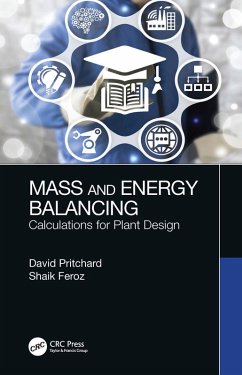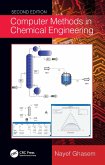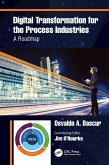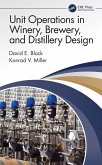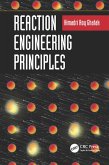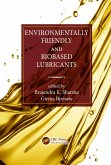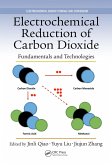48,95 €
48,95 €
inkl. MwSt.
Sofort per Download lieferbar

24 °P sammeln
48,95 €
Als Download kaufen

48,95 €
inkl. MwSt.
Sofort per Download lieferbar

24 °P sammeln
Jetzt verschenken
Alle Infos zum eBook verschenken
48,95 €
inkl. MwSt.
Sofort per Download lieferbar
Alle Infos zum eBook verschenken

24 °P sammeln
- Format: ePub
- Merkliste
- Auf die Merkliste
- Bewerten Bewerten
- Teilen
- Produkt teilen
- Produkterinnerung
- Produkterinnerung

Bitte loggen Sie sich zunächst in Ihr Kundenkonto ein oder registrieren Sie sich bei
bücher.de, um das eBook-Abo tolino select nutzen zu können.
Hier können Sie sich einloggen
Hier können Sie sich einloggen
Sie sind bereits eingeloggt. Klicken Sie auf 2. tolino select Abo, um fortzufahren.

Bitte loggen Sie sich zunächst in Ihr Kundenkonto ein oder registrieren Sie sich bei bücher.de, um das eBook-Abo tolino select nutzen zu können.
This text provides a comprehensive set of calculations relating to mass and energy balances for an entire process plant. An ammonia synthesis plant is the model to develop the relevant mass and energy balances necessary for the design and subsequent production, as the production of ammonia synthesis gas is an internationally used process.
- Geräte: eReader
- ohne Kopierschutz
- eBook Hilfe
- Größe: 3.48MB
Andere Kunden interessierten sich auch für
![Computer Methods in Chemical Engineering (eBook, ePUB) Computer Methods in Chemical Engineering (eBook, ePUB)]() Nayef GhasemComputer Methods in Chemical Engineering (eBook, ePUB)62,95 €
Nayef GhasemComputer Methods in Chemical Engineering (eBook, ePUB)62,95 €![Digital Transformation for the Process Industries (eBook, ePUB) Digital Transformation for the Process Industries (eBook, ePUB)]() Osvaldo A. BascurDigital Transformation for the Process Industries (eBook, ePUB)121,95 €
Osvaldo A. BascurDigital Transformation for the Process Industries (eBook, ePUB)121,95 €![Process Safety (eBook, ePUB) Process Safety (eBook, ePUB)]() James A. KleinProcess Safety (eBook, ePUB)62,95 €
James A. KleinProcess Safety (eBook, ePUB)62,95 €![Unit Operations in Winery, Brewery, and Distillery Design (eBook, ePUB) Unit Operations in Winery, Brewery, and Distillery Design (eBook, ePUB)]() David E. BlockUnit Operations in Winery, Brewery, and Distillery Design (eBook, ePUB)115,95 €
David E. BlockUnit Operations in Winery, Brewery, and Distillery Design (eBook, ePUB)115,95 €![Reaction Engineering Principles (eBook, ePUB) Reaction Engineering Principles (eBook, ePUB)]() Himadri Roy GhatakReaction Engineering Principles (eBook, ePUB)137,95 €
Himadri Roy GhatakReaction Engineering Principles (eBook, ePUB)137,95 €![Environmentally Friendly and Biobased Lubricants (eBook, ePUB) Environmentally Friendly and Biobased Lubricants (eBook, ePUB)]() Environmentally Friendly and Biobased Lubricants (eBook, ePUB)65,95 €
Environmentally Friendly and Biobased Lubricants (eBook, ePUB)65,95 €![Electrochemical Reduction of Carbon Dioxide (eBook, ePUB) Electrochemical Reduction of Carbon Dioxide (eBook, ePUB)]() Electrochemical Reduction of Carbon Dioxide (eBook, ePUB)62,95 €
Electrochemical Reduction of Carbon Dioxide (eBook, ePUB)62,95 €-
-
-
This text provides a comprehensive set of calculations relating to mass and energy balances for an entire process plant. An ammonia synthesis plant is the model to develop the relevant mass and energy balances necessary for the design and subsequent production, as the production of ammonia synthesis gas is an internationally used process.
Dieser Download kann aus rechtlichen Gründen nur mit Rechnungsadresse in A, B, BG, CY, CZ, D, DK, EW, E, FIN, F, GR, HR, H, IRL, I, LT, L, LR, M, NL, PL, P, R, S, SLO, SK ausgeliefert werden.
Produktdetails
- Produktdetails
- Verlag: Taylor & Francis eBooks
- Seitenzahl: 146
- Erscheinungstermin: 20. Mai 2021
- Englisch
- ISBN-13: 9781000392326
- Artikelnr.: 61373000
- Verlag: Taylor & Francis eBooks
- Seitenzahl: 146
- Erscheinungstermin: 20. Mai 2021
- Englisch
- ISBN-13: 9781000392326
- Artikelnr.: 61373000
- Herstellerkennzeichnung Die Herstellerinformationen sind derzeit nicht verfügbar.
Dr. David Pritchard is a retired academic who continues to work in academic areas of Chemical Engineering. He obtained his first degree from the Manchester College of Science and Technology, Faculty of Technology in the University of Manchester, UK. He obtained his Doctorate from Bath University of Technology (now University of Bath), UK. On graduation he initially worked in the process industries for British Titan (subsequently Tioxide International, UK) as a research officer looking to improve the plant engineering. From here he joined the, then, Teesside Polytechnic, Department of Chemical Engineering, UK, as a Lecturer. The Polytechnic was subsequently incorporated as the University of Teesside and still exists as such. At Teesside he held every undergraduate course leadership post that then existed (not all at the same time) and was responsible for course development and, with colleagues, produced a pioneering first year course on the Chemical Engineering degree. This first year obtained awards for the novelty of the teaching approach including recognition from the RSA. He lectured Chemical Engineering at every level from undergraduate Diploma (HND, HNC), Degree (BSc, BEng) Postgraduate (MSc) and Design Projects. He helped pioneer the introduction of part-time routes for degrees in chemical engineering and managed many students studying on ERASMUS schemes in receiving degrees under a special, externally examined, pathway. He also carried out research into a range of areas particularly in the fields of Separation Processes and Phase Equilibria. He produced over 30 refereed research papers together with a number of conference papers and supervised over 20 PhD students and a number of MSc students. Within the newly formed School of Science and Technology, he took responsibility for the running of the Division of Chemical Engineering and oversaw various academic initiatives. He acted as an external examiner for various UK courses at undergraduate and postgraduate level and was a PhD external examiner.
Dr. Shaik Feroz is currently working at Prince Mohammed Bin Fahd University, Kingdom of Saudi Arabia. Dr. Feroz obtained his doctorate in the field of Chemical Engineering from Andhra University, India in 2004 and Post Doc Research Fellow from Leibniz University, Germany in 2015, M. Tech in Chemical Engineering from Osmania University, India in 1998 and B. Tech in Chemical Engineering from S. V. University, India in 1992. He obtained the Post Graduate Diploma in Environmental Studies from Andhra University in 2003. Dr. Feroz has expertise in process engineering, plant design and troubleshooting, quality control using advance analytical equipment, wastewater treatment, solar energy systems (PV & CSP) for desalination, hot water systems and water treatment, synthesis of nanophotocatalysts, simultaneous treatment of wastewater and production of hydrogen, environmental impact assessment, design, delivery and management chemical & process engineering programs and tailored made industrial based training programs related to chemical and process engineering. Dr. Feroz has more than 160 publications to his credit in journals and conferences of international repute and supervised 4 PhD research works with another 2 on-going. Dr. Feroz is associated as the Principal Investigator/CO-Investigator to a number of research projects and also involved as "Technology transfer agent" by Innovation Research Center, Sultanate of Oman. He has a significant contribution as eitorial member and peer reviewer for various reputed international journals and conferences. He was awarded "Best Researcher" by the Caledonian College of Engineering for the year 2014. Dr. Feroz has total experience of 27 years in teaching, research and industry.
Dr. Shaik Feroz is currently working at Prince Mohammed Bin Fahd University, Kingdom of Saudi Arabia. Dr. Feroz obtained his doctorate in the field of Chemical Engineering from Andhra University, India in 2004 and Post Doc Research Fellow from Leibniz University, Germany in 2015, M. Tech in Chemical Engineering from Osmania University, India in 1998 and B. Tech in Chemical Engineering from S. V. University, India in 1992. He obtained the Post Graduate Diploma in Environmental Studies from Andhra University in 2003. Dr. Feroz has expertise in process engineering, plant design and troubleshooting, quality control using advance analytical equipment, wastewater treatment, solar energy systems (PV & CSP) for desalination, hot water systems and water treatment, synthesis of nanophotocatalysts, simultaneous treatment of wastewater and production of hydrogen, environmental impact assessment, design, delivery and management chemical & process engineering programs and tailored made industrial based training programs related to chemical and process engineering. Dr. Feroz has more than 160 publications to his credit in journals and conferences of international repute and supervised 4 PhD research works with another 2 on-going. Dr. Feroz is associated as the Principal Investigator/CO-Investigator to a number of research projects and also involved as "Technology transfer agent" by Innovation Research Center, Sultanate of Oman. He has a significant contribution as eitorial member and peer reviewer for various reputed international journals and conferences. He was awarded "Best Researcher" by the Caledonian College of Engineering for the year 2014. Dr. Feroz has total experience of 27 years in teaching, research and industry.
Introduction. Section I: Mass Balance. 1. Desulfuriser. 2. Primary
Reformer. 3. Secondary Reformer. 4. HTS Converter. 5. LTS Converter. 6.
Absorber. 7. Methanator. Section II: Energy Balance. 8. Intercooler. 9.
Feed Heater. 10. Reformed Gas Boiler. 11. Converted Gas Boiler A and B. 12.
Quench Cooler. 13. High pressure BFW. 14. CO2 Reboiler. 15. Interchanger.
16. Low Pressure BFW Heater. 17. Final Cooler.
Reformer. 3. Secondary Reformer. 4. HTS Converter. 5. LTS Converter. 6.
Absorber. 7. Methanator. Section II: Energy Balance. 8. Intercooler. 9.
Feed Heater. 10. Reformed Gas Boiler. 11. Converted Gas Boiler A and B. 12.
Quench Cooler. 13. High pressure BFW. 14. CO2 Reboiler. 15. Interchanger.
16. Low Pressure BFW Heater. 17. Final Cooler.
Introduction. Section I: Mass Balance. 1. Desulfuriser. 2. Primary
Reformer. 3. Secondary Reformer. 4. HTS Converter. 5. LTS Converter. 6.
Absorber. 7. Methanator. Section II: Energy Balance. 8. Intercooler. 9.
Feed Heater. 10. Reformed Gas Boiler. 11. Converted Gas Boiler A and B. 12.
Quench Cooler. 13. High pressure BFW. 14. CO2 Reboiler. 15. Interchanger.
16. Low Pressure BFW Heater. 17. Final Cooler.
Reformer. 3. Secondary Reformer. 4. HTS Converter. 5. LTS Converter. 6.
Absorber. 7. Methanator. Section II: Energy Balance. 8. Intercooler. 9.
Feed Heater. 10. Reformed Gas Boiler. 11. Converted Gas Boiler A and B. 12.
Quench Cooler. 13. High pressure BFW. 14. CO2 Reboiler. 15. Interchanger.
16. Low Pressure BFW Heater. 17. Final Cooler.
